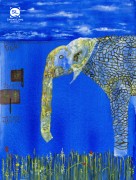I’ve realized recently that I can’t remove my faults from my fantasies—my fantasies have to work with or around them. I think your Flat Stanley bears this, too. How about you—are you you in your fantasies or are you the ideal you?
Imagining an ideal me is beyond my ability anymore, but ideal anythings are no fun anyway—in the world, on the page. Every writing project falls apart, like every fantasy, so why not lean into that from the get-go. My main tactic (as a writer and as a teacher) is to invent some tidy premise and then wait happily for everything to unravel.
I have to admit, I didn’t know enough about Flat Stanley when I first read your story to be qualified to ask you questions (despite making my son a Flat Stanley costume for school a few years ago). So, I read a lot of Flat Stanley this week. My question is: What is it about making obscure and profound literary references that makes academics feel so superior to regular people?
Hashtag not all academics. I feel superior to regular people by being a completist about my favorite Bachelorette podcasts and never saying girl when I mean woman. Oh wait—that’s how I feel superior to other academics.
If Flat Stanley were to connect with another beloved children’s book character, who would it be? What about non-children’s lit?
Right now I’m reading The Milkman by Anna Burns, set in 1970s Northern Ireland, and I’d love to give a Flat Stanley to every man in that book, and most of the women, too. Everybody needs a little paper kid who asks, “Wait, why is this the way we do things here?” Not to take to task that novel’s particular place or moment or those particular gender norms. I’m just saying that once we’re entrenched in any world, or story, it might be useful to be watched and questioned by a fragile outsider, a tourist who will report back to an eight-year-old person somewhere else.
In regards to the first half of the question: I feel bad that Flat Stanley is so often an unsavvy dolt in my stories. He needs a badass troublemaker friend who doesn’t fall for anything. Pippi Longstocking, maybe, or Lucy van Pelt.
In the end, this story is all about comfort, about reaching that point with a partner when the sheen has worn and the real relationship can start. I’ve known people who date around specifically to avoid this, keeping the sheen, never knowing anyone. Should I envy them or should they envy my monogamy?
To each their own, I guess, but I went to the dentist this morning and realized that after a few years my very shy hygienist is finally starting to get comfortable with me, chatty even, and this makes me consider moving to a whole new town. That is to say, the sheen people should definitely envy you.
Is Dumbledore gay?
Yes. All air signs are gay.


